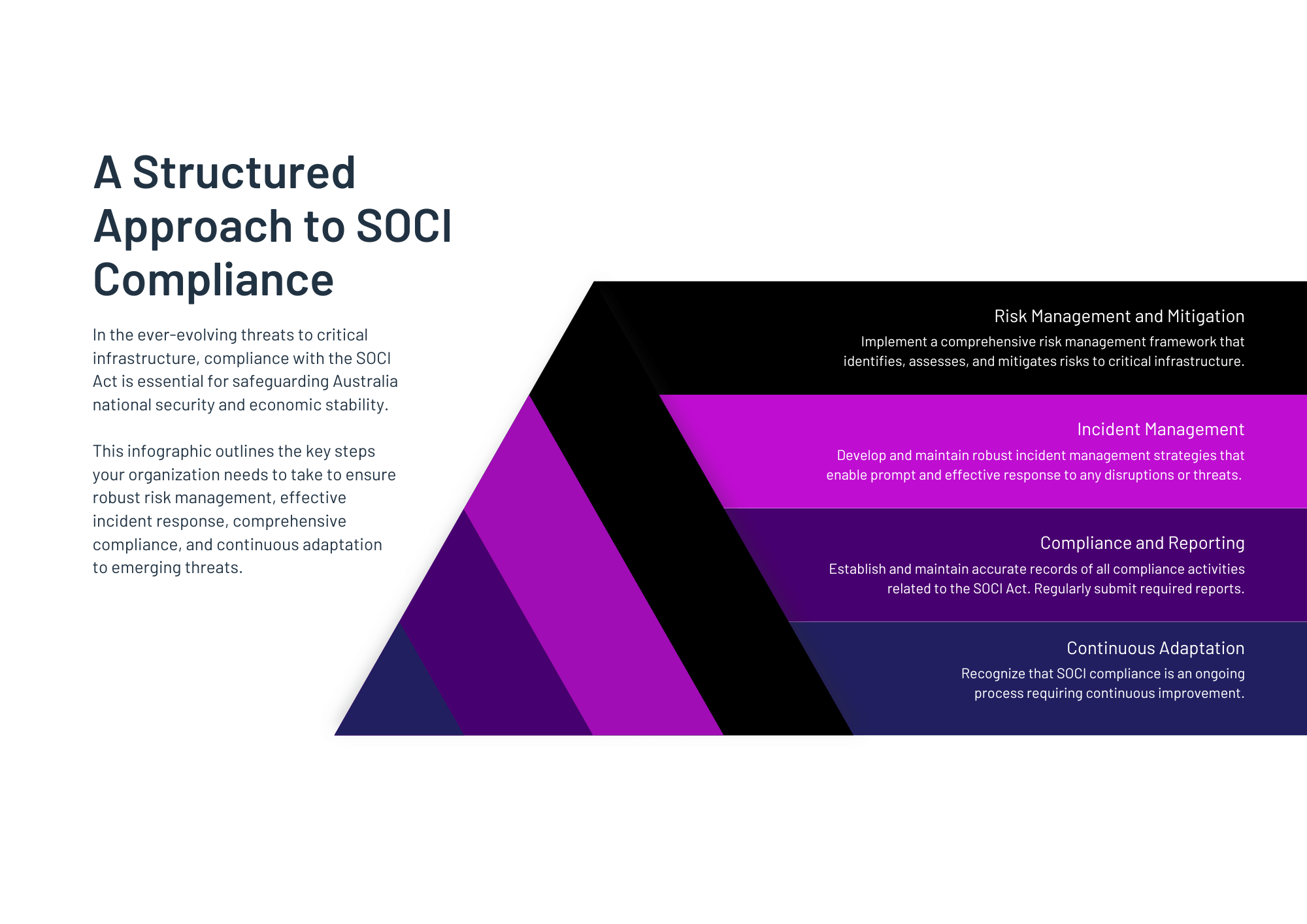Organisations classified under the Australian Security of Critical Infrastructure (SOCI) Act face unique challenges in maintaining operational security, resilience, and compliance. Ensuring full compliance with SOCI requirements is crucial for protecting essential services, safeguarding critical assets, and ensuring continuity in the face of emerging threats.
The SOCI Act provides a framework to manage and protect critical infrastructure. Cybersecurity compliance was required by 17 August 2024. As organisations move beyond the initial compliance deadline of August 17th, the focus shifts to maintaining and continuously improving their SOCI compliance capabilities.
What is SOCI?
The Security of Critical Infrastructure Act (SOCI Act) is an Australian regulation focused on enhancing the resilience and security of the country’s critical infrastructure. SOCI addresses key areas such as risk management, incident response, and reporting requirements for entities critical to national security.

SOCI benefits organisations by providing a structured approach for identifying and mitigating risks, ensuring operational continuity, and maintaining trust with stakeholders and the public. The SOCI Act does not prescribe a specific risk management framework, but acceptable frameworks are typically those that align with widely recognized standards such as ISO 31000 (Risk Management), NIST Cybersecurity Framework, or the Australian Government’s Protective Security Policy Framework (PSPF). These frameworks should be tailored to the specific needs of the organisation, ensuring they effectively address the identification, assessment, mitigation, and monitoring of risks relevant to critical infrastructure.
iluminr’s research has found that implementing Australia’s Security of Critical Infrastructure (SOCI) Act has presented 5 key challenges for organisations.
- Complexity of Requirements: The SOCI Act mandates a range of obligations that are difficult to interpret and apply uniformly across different sectors. Organisations often struggle to understand and implement these requirements, especially when it comes to integrating them into existing processes. For organisations already subject to other regulatory frameworks, such as the Australian Privacy Act or sector-specific regulations, there may be confusion or overlap in compliance requirements, leading to inefficiencies and increased compliance costs.
- Third Party Dependencies: Many organisations rely on third-party vendors and suppliers, making it difficult to ensure that all parts of the supply chain comply with the SOCI Act. Managing these relationships and ensuring compliance across the entire supply chain is a significant challenge.
- Evolving Threats: As cyber threats continue to evolve, organisations must constantly update their defenses to remain compliant with the SOCI Act. This dynamic nature of cybersecurity threats adds another layer of complexity to maintaining compliance.
- Lack of Awareness and Training: Many organisations, particularly in non-IT sectors, may lack awareness of the SOCI Act’s specific requirements. This can lead to insufficient training and preparedness among employees responsible for compliance.
- Demonstrating Continuous Improvement: The SOCI Act emphasizes that cybersecurity is not a one-time effort but requires continuous improvement. This necessitates ongoing investment in cybersecurity infrastructure and capabilities, which can be resource-intensive and challenging for organisations to maintain over time.
With the initial milestone deliverable behind them, many organisations are still grappling with the ongoing challenge of balancing the stringent requirements of the regulatory regime, their broader business needs, and the sustainability of their compliance programs.
Organisations are seeking ways to integrate SOCI Act obligations into their existing operations without compromising efficiency or increasing operational costs. This involves not only meeting the legal requirements but also ensuring that the compliance measures are adaptable and scalable to support long-term business objectives.

Building the Muscle Memory for SOCI
Organisations can effectively navigate the ongoing challenges of SOCI compliance leveraging a streamlined Test-Respond-Learn approach. The following steps outline how this approach can strengthen and sustain SOCI compliance efforts in line with the core pillars of the SOCI Act.
Test
☐ Regular Infrastructure Validation: Continuously assess and validate the classification and documentation of critical infrastructure. This involves routinely testing these elements against current regulatory standards to ensure they remain accurate and relevant.
☐ Proactive Risk Identification: Implement regular risk assessments and gap analyses using Microsimulations to uncover vulnerabilities before they become threats. This proactive testing ensures that risk management strategies are always up to date.
☐ Scenario-Based Risk Evaluation: Test the organisation’s risk appetite and tolerance levels against different threat scenarios. This helps in fine-tuning detection thresholds and aligning them with the organisation’s evolving risk profile.
☐ System Resilience Testing: Frequently test the resilience of critical systems through stress tests and simulations. This ensures that backup, recovery, and continuity measures are robust and capable of withstanding disruptions.
Respond
☐ Dynamic Incident Response Plans: Continuously update and refine incident management plans, ensuring they address both emerging threats and new technologies. Use these plans to guide the organisation’s response during live incidents.
☐ Streamlined Detection and Action: Implement real-time detection and logging mechanisms that feed directly into a streamlined incident reporting process.
☐ Real-Time Incident Classification: Utilize predefined response strategies that have been tested during simulations to classify and respond to incidents in real-time. This approach ensures that the organisation can adapt quickly to any incident.
☐ Frequent Response Exercises: Regularly conduct incident response drills and exercises to validate the effectiveness of response protocols. This continuous practice ensures that the organisation is always prepared to respond effectively.
Learn
☐ Comprehensive Documentation: Maintain detailed records of all compliance activities and lessons learned from incidents, updating them as new requirements and insights emerge.
☐ Continuous Improvement Through Audits: Conduct regular audits to evaluate and enhance the compliance program, ensuring it evolves with new challenges.
☐ Collaborative Knowledge Sharing: Engage in ongoing collaboration with regulators, industry partners, and stakeholders to stay informed of best practices and integrate new knowledge into your compliance efforts.
This streamlined Test-Respond-Learn methodology builds a dynamic and resilient SOCI compliance program that adapts with both regulatory requirements and the changing needs of your business.
How iluminr Can Help
iluminr’s platform supports the test-respond-learn process with intuitive tools that build compliance obligations into the rhythm and routine of your business:
- Single- and Multiplayer Microsimulations: iluminr Microsimulations allow your team to engage in realistic, scenario-based exercises that replicate potential threats and incidents. Whether run as single-player or multiplayer sessions, these simulations help teams practice their response in a controlled environment, enhancing readiness and resilience across your organisation.
- Event Rooms: iluminr Event Rooms provide a centralized place for coordinating and managing responses during critical incidents. These virtual spaces enable real-time communication, decision-making, and resource allocation, ensuring that all team members are aligned and informed as events unfold.
- Playbooks: iluminr customizable Playbooks offer step-by-step guidance for handling various scenarios, from cyber attacks to operational disruptions. These Playbooks are designed to be easily accessible during an incident, providing teams with clear, actionable instructions that help streamline response efforts and ensure consistency.
By incorporating these tools, iluminr helps your organisation build a robust, adaptable, and responsive SOCI compliance program that effectively prepares you for the complexities of today’s cybersecurity challenge.
For more information on SOCI compliance and how iluminr can help your organisation meet the evolving requirements of SOCI, book a demo.














